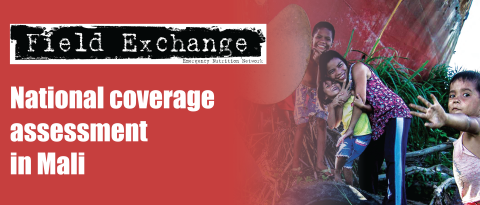SPRING (Strengthening Partnerships, Results and Innovations in Nutrition Globally)
|
Name: |
SPRING (Strengthening Partnerships, Results and Innovations in Nutrition Globally) |
Established: |
2011 (5 year USAID funded project) |
| Address: |
JSI Research & Training Institute, Inc., |
Director: |
Carolyn Hart |
| Email: | No. of HQ staff: | 45 | |
| Website: | No of staff worldwide: |
175 |
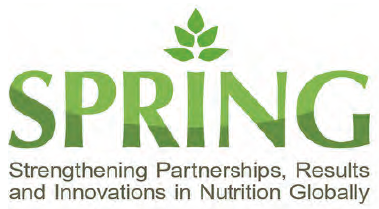 SPRING’s mission is to strengthen global and country efforts to scale up high-impact nutrition practices and policies. SPRING provides state-of-the-art technical support focused on preventing stunting and maternal and child anaemia in the first 1,000 days, linking agriculture and nutrition, and creating social change and behaviour change through communication. SPRING’s mission supports two major US Government initiatives: Ending Preventable Child and Maternal Deaths and Feed the Future.
SPRING’s mission is to strengthen global and country efforts to scale up high-impact nutrition practices and policies. SPRING provides state-of-the-art technical support focused on preventing stunting and maternal and child anaemia in the first 1,000 days, linking agriculture and nutrition, and creating social change and behaviour change through communication. SPRING’s mission supports two major US Government initiatives: Ending Preventable Child and Maternal Deaths and Feed the Future.
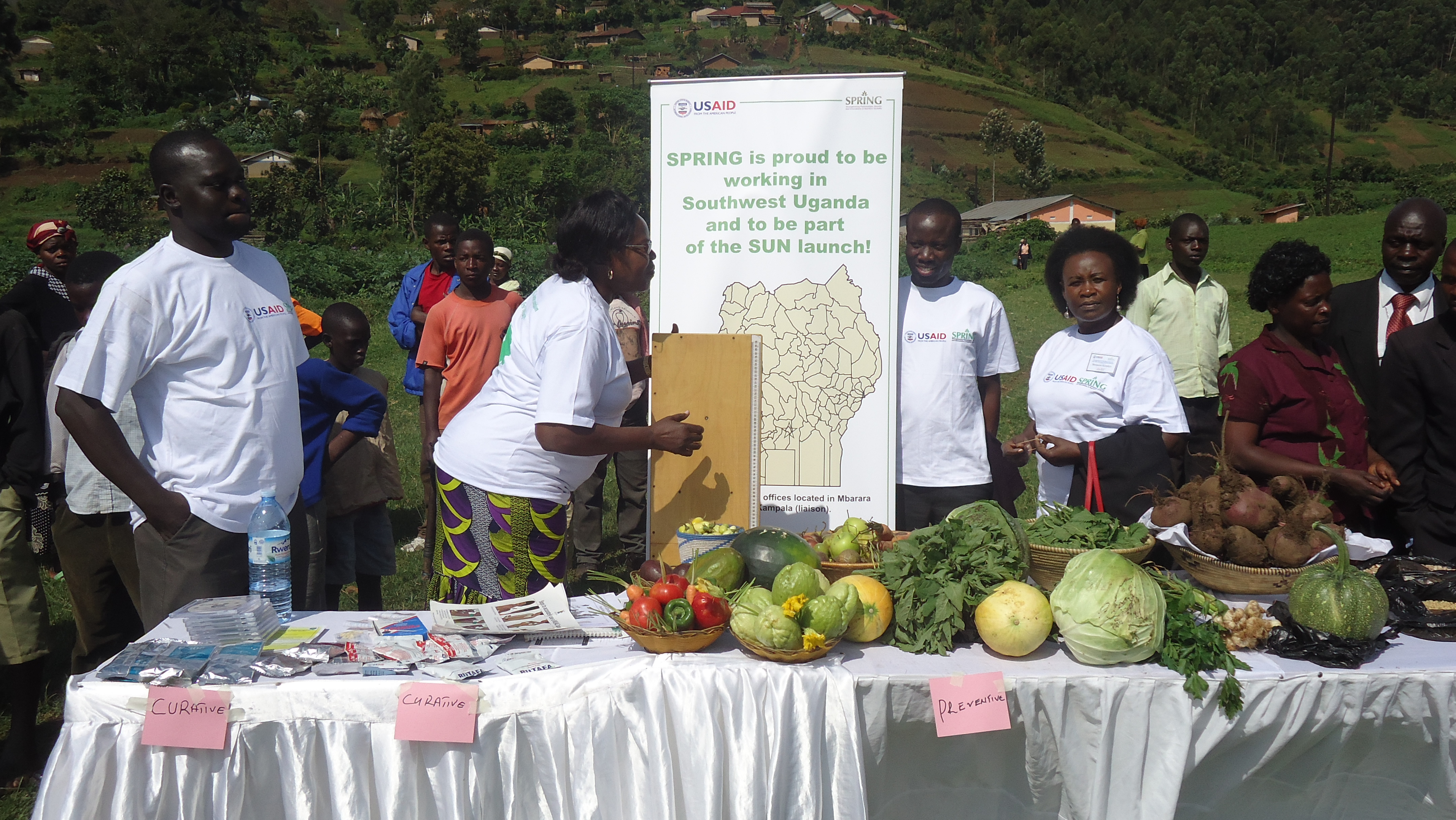 For this issue of Field Exchange, the ENN interviewed Carolyn Hart (Project Director) and Anuradha Narayan (Director, Global Initiatives) from SPRING for the agency profile slot. SPRING is a partnership initiative between the John Snow Inc, Research and Training Institute, Inc2 (JSI) and four US based international non-governmental organisations (INGOs) (Helen Keller International (HKI), Save the Children US (SC US), The Manoff Group, and the International Food Policy Research Institute (IFPRI). SPRING is a five-year USAID-funded global health programme. JSI is a public health consultancy firm and is the lead agency for SPRING.
For this issue of Field Exchange, the ENN interviewed Carolyn Hart (Project Director) and Anuradha Narayan (Director, Global Initiatives) from SPRING for the agency profile slot. SPRING is a partnership initiative between the John Snow Inc, Research and Training Institute, Inc2 (JSI) and four US based international non-governmental organisations (INGOs) (Helen Keller International (HKI), Save the Children US (SC US), The Manoff Group, and the International Food Policy Research Institute (IFPRI). SPRING is a five-year USAID-funded global health programme. JSI is a public health consultancy firm and is the lead agency for SPRING.

Carolyn has held various positions in JSI for over 30 years, focusing for most of the past 15 years in the area of public health supply chains. Her Masters was in Public Health Policy and Management. She has worked mainly on global programmes and in short-term capacities in over 20 countries and lived and worked in Thailand for a local NGO. Carolyn has served as Project Director of SPRING for a little over one year.
 Anuradha studied nutrition and worked with SC US for nine years, including a stint as a technical advisor for the southern Africa region. This involved a lot of support for emergency programming. She subsequently worked on large-scale food security and nutrition programmes in Bangladesh and then joined HKI as Deputy Regional Director for East and Southern Africa. Anuradha has been with SPRING for three and a half years.
Anuradha studied nutrition and worked with SC US for nine years, including a stint as a technical advisor for the southern Africa region. This involved a lot of support for emergency programming. She subsequently worked on large-scale food security and nutrition programmes in Bangladesh and then joined HKI as Deputy Regional Director for East and Southern Africa. Anuradha has been with SPRING for three and a half years.
SPRING was established by USAID as a five-year programme in 2011 with a 200 million dollar ceiling2. The four agencies partnering with JSI have various and complementary areas of nutrition expertise. The programme is centrally funded, i.e. from Washington, but also receives funding from USAID missions in countries. SPRING now has established programmes in seven countries (Bangladesh, Ghana, Haiti, Mali, Kyrgyz Republic, Nigeria, and Uganda) staffed by 175 people (mostly nationals and with a wide variety of professional skills, including nutrition, medical, food security and health and programme management). Many of these staff are embedded in the four partner organisations. There are a further 45 staff in Washington D.C. The programme was not set up to serve the needs of any particular country but rather to be a technical partner to USAID and respond to USAID mission requests from countries that want to implement nutrition programmes. The dual mandate of SPRING is i) to develop and improve country-specific approaches to scaling up nutrition programming and ii) to connect evidence and programme learning to best practice, in order to improve and monitor nutrition programming, policies and outcomes. SPRING hopes to be able to learn from individual country experiences and foster inter-country learning, and global exchange of experience.
Over the first two and a half years of their programme, SPRING has coalesced around four broad thematic areas of work. One area of work is catalysing ‘social and behaviour change’ through communications, which can involve anything from training for community health workers (CHWs) for interpersonal communication, to use of mass media in community-based programmes. SPRING is working with a group called Development Media International (DMI) using local radio in Burkina Faso to promote nutrition messaging. SPRING is particularly interested in how context makes a difference to social behaviour change approaches. DMI and its partners in Burkina Faso have been conducting a randomised controlled trial (RCT) to see whether the radio communication programme has had a direct impact on child mortality and SPRING will extend this to include nutrition-related behaviours. SPRING has also been working with a group called Digital Green in India in the area of social behaviour change in order to address complex behaviour affecting nutrition.
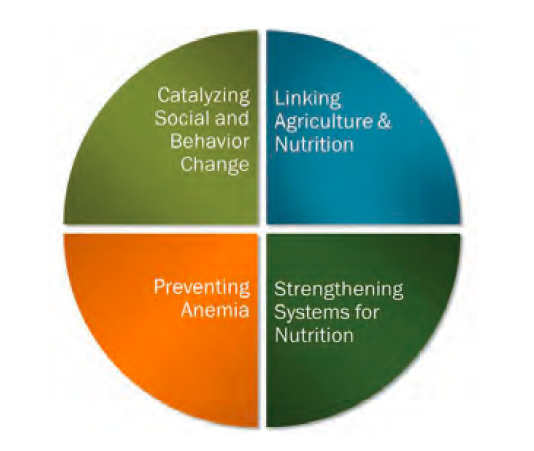
A second area of work involves micronutrient programming, particularly around prevention of anaemia. Here, the SPRING approach is broad-based, multisectoral, i.e. not just around food and nutrition but including other sectors like water, sanitation and hygiene (WASH), health, and livelihoods. They are currently supporting three countries to undertake an analysis of the causal chains around anaemia.
A third area of work relates to the linkages between agriculture and nutrition, i.e. nutrition-sensitive programming, and how this can be operationalised. SPRING is looking at numerous models of integrating nutrition and agriculture in USAID priority countries and also trying to better understand the behaviour of actors along the value chain in order to understand how this impacts nutrition.
A fourth and final area of work relates to food and health systems. This is more conceptual and involves consideration of what changes at system level will lead to better implementation of nutrition interventions. Work is ongoing in Nepal and Uganda where SPRING is looking at how integrated plans are translated at district level.
ENN asked Carolyn and Anuradha to highlight what they felt were SPRING areas of success to date. They both highlighted the mass media and interpersonal communication work around behaviour change, although qualifying this by saying it is hard to show lasting impact in only three years. They also felt that their work on linking agriculture and nutrition is critically important. They described how the multi-million dollar Presidential initiative ‘Feed the Future’ has focused mainly on increasing agricultural production and less so on addressing nutrition (although this is part of its dual mandate and the original intention of the initiative). SPRING’s work now directly supports the link and started with the design of three global meetings to bring together Agriculture and Health Officers to explore links between the two key sectors and ensure that agricultural programmes positively impact nutrition. A framework adapted from IFPRI was used to centre the discussions and Feed the Future is now embracing this “Ag- Nutrition Pathways” as part of how they approach their work.
The discussion then moved onto what they both thought were the major challenges in the nutrition sector. Apart from the four thematic areas outlined above, Carolyn sees the biggest challenge as the disconnection between food systems and nutrition needs of families and communities and the fact that not enough people talk about this. Anuradha cited the fact that the nutrition community just tends to talk amongst themselves, and that there aren’t adequate multi-stakeholder/sector platforms – especially between private and public sector organisations. She also felt that SPRING may not have used the collective voice of its partnership to the best effect as of yet. Carolyn noted that it is difficult to be both an implementing agency and an advocate. They therefore need to find allies with complementary skills. SPRING is now entering a programme phase where they have to extract and connect learning from country experiences and pull this together with some of the work they have been doing at global level. They need to switch “from doing to knowledge management.” The trouble is that their five-year programme doesn’t give a lot of time for this. Every country has a performance monitoring plan and these data will soon be scrutinised. A key question will be “are we learning the same thing in any number of countries and are there better ways to do business?”
Anuradha is very keen to reach out to multiple partners to share information and learning, which is why links with organisations like ENN will become increasingly important.
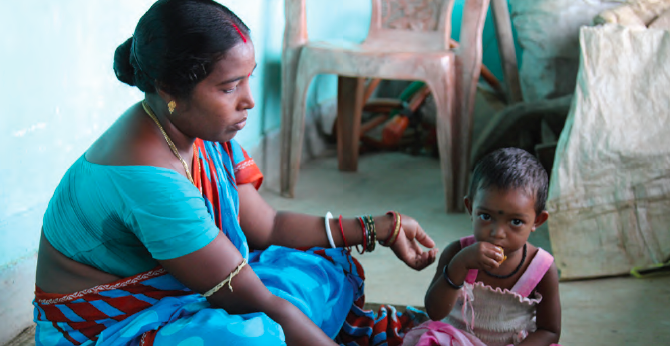 ENN then asked how SPRING sees itself fitting into the ‘nutrition architecture’. Carolyn responded by saying that SPRING is the eyes, ears, legs, and hands of USAID in terms of nutrition programme implementation, providing critical technical support and learning. SPRING is playing a critical role in implementing USAID’s Multi-Sectoral Nutrition Strategy (2014 – 2025) which aims to reduce chronic malnutrition. Anuradha added that having multiple partners can be challenging at times but this is more than offset by the fact that they all have different skill sets and complementary experience. She re-emphasised that their role in linking nutrition and agriculture is unique and will be critical to the nutrition sector in the long term.
ENN then asked how SPRING sees itself fitting into the ‘nutrition architecture’. Carolyn responded by saying that SPRING is the eyes, ears, legs, and hands of USAID in terms of nutrition programme implementation, providing critical technical support and learning. SPRING is playing a critical role in implementing USAID’s Multi-Sectoral Nutrition Strategy (2014 – 2025) which aims to reduce chronic malnutrition. Anuradha added that having multiple partners can be challenging at times but this is more than offset by the fact that they all have different skill sets and complementary experience. She re-emphasised that their role in linking nutrition and agriculture is unique and will be critical to the nutrition sector in the long term.
We finished off the interview with a question often asked in this agency profile slot – “how would you describe the culture and way of working within SPRING?” Carolyn replied that it is very collegial, building systems as the work proceeds, and not overly bureaucratic. Anuradha added to this by saying that working on a project like SPRING requires a strong understanding of how an influential donor like USAID operates in the field of nutrition and to be able to respond to that effectively.
SPRING is country-driven: we understand country and even district level contexts, and that the countries are driving their own agendas and informing the global agenda.
We are thought leaders: we are leaders in, or dedicated to advancing, our four global focus areas, and promoting evidence-based programming at all levels.
We are committed: to improving lives and holding ourselves accountable for the work that we do at the household, community, district, and national level.
We are catalytic: developing tools, guidance, and knowledge; sharing these to drive positive change.
1 John Snow Incorporated is a 40 year old public health company established to bring management solutions to the public health space in the US and internationally. It has a profit and non-profit arm, the latter being the JSI Research and Training Institute Inc. JSI has over 2,500 staff in over 40 countries.
2 SPRING is a USAID-funded cooperative agreement. It is not a corporate entity that can receive additional funding, although funding can be raised and channelled through SPRING partner organisations.


